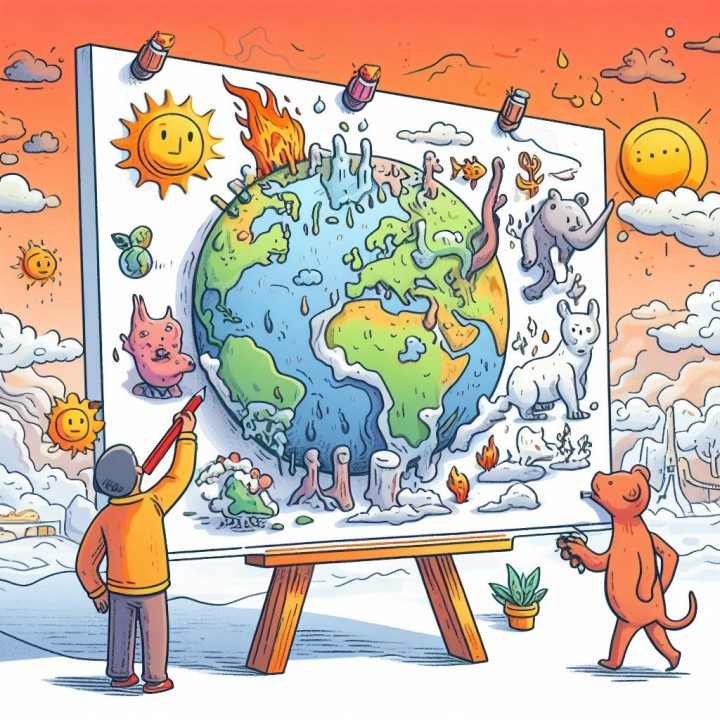
Anthropomorphic Global Warming: Understanding the Impact of Human Activities on Climate Change
Tom Kirkman I tried to see where your challenge would bring me from zero to hero......All data is taken from the internet and are as is.
Introduction
Climate change has become one of the most pressing issues of our time. The Earth's climate is changing at an unprecedented rate, and the scientific consensus is clear: human activities are the primary cause. This phenomenon, often referred to as anthropomorphic global warming (AGW) or climate change, has far-reaching implications for our planet and its inhabitants. In this essay, we will explore the causes and consequences of AGW, discuss the concept of global cooling, and examine the importance of achieving net-zero emissions. Throughout, we will draw upon a range of well-reasoned whitepapers to support our arguments.
Understanding Anthropomorphic Global Warming
Anthropomorphic global warming refers to the increase in the Earth's average surface temperature due to human activities, particularly the burning of fossil fuels and deforestation. The release of greenhouse gases, such as carbon dioxide (CO2), methane (CH4), and nitrous oxide (N2O), traps heat in the atmosphere, leading to a rise in global temperatures. This phenomenon has been extensively studied and documented by scientific organizations worldwide.
The Intergovernmental Panel on Climate Change (IPCC), in its Fifth Assessment Report, concluded that "human influence on the climate system is clear." The report states that it is "extremely likely" that more than half of the observed increase in global average surface temperature since the mid-20th century is due to human influence. This conclusion is based on a comprehensive analysis of multiple lines of evidence, including temperature records, ice core data, and climate models.
The consequences of AGW are wide-ranging and include rising sea levels, extreme weather events, loss of biodiversity, and disruptions to ecosystems. According to a whitepaper published by the World Wildlife Fund (WWF), climate change threatens to wipe out nearly half of all species by the end of this century. Additionally, the melting of polar ice caps and glaciers contributes to rising sea levels, which pose a significant risk to coastal communities around the world.
Exploring Global Cooling
While AGW is widely accepted by the scientific community, there have been occasional claims of global cooling, suggesting that the Earth's climate is actually getting colder. However, these claims are not supported by scientific evidence and are often based on cherry-picked data or misinterpretation of short-term temperature fluctuations.
A whitepaper published by NASA debunks the myth of global cooling, stating that "the long-term trend of global warming remains clear and consistent." The paper highlights that while there may be temporary periods of cooling due to natural climate variability, the overall trend is towards warming. It is crucial to distinguish between short-term weather patterns and long-term climate trends when assessing global temperature changes.
The Importance of Net-Zero Emissions
Given the clear link between human activities and AGW, it is imperative that we take action to mitigate climate change. Achieving net-zero emissions is a key goal in this regard. Net-zero refers to balancing the amount of greenhouse gases emitted with an equivalent amount removed from the atmosphere.
The Paris Agreement, signed by 197 countries, aims to limit global warming to well below 2 degrees Celsius above pre-industrial levels and pursue efforts to limit the temperature increase to 1.5 degrees Celsius. To achieve this, countries must transition to low-carbon economies and significantly reduce their greenhouse gas emissions.
A whitepaper published by the International Energy Agency (IEA) outlines strategies for achieving net-zero emissions by 2050. These include investing in renewable energy sources, improving energy efficiency, electrifying transportation systems, and implementing carbon capture and storage technologies. The whitepaper emphasizes the need for international cooperation and policy support to facilitate this transition.
Conclusion
Anthropomorphic global warming is a scientifically supported phenomenon with far-reaching consequences for our planet. The evidence overwhelmingly points to human activities as the primary driver of climate change. While occasional claims of global cooling may arise, they are not supported by scientific consensus or long-term data trends.
To address AGW effectively, achieving net-zero emissions is crucial. This requires a concerted effort from governments, businesses, and individuals worldwide. By transitioning to renewable energy sources, improving energy efficiency, and implementing carbon capture technologies, we can mitigate the impacts of climate change and create a sustainable future for generations to come.
References:
1. Intergovernmental Panel on Climate Change (IPCC). (2014). Fifth Assessment Report: Summary for Policymakers.
2. World Wildlife Fund (WWF). (2018). Living Planet Report 2018: Aiming Higher.
3. National Aeronautics and Space Administration (NASA). (2019). Climate Change: How Do We Know?
4. International Energy Agency (IEA). (2021). Net Zero by 2050: A Roadmap for the Global Energy Sector.
Surveyor/ Commissioning Lead
6moWell written. But again like you mentioned in the comments section. I don't agree human activities are the main causes. :)
Chemical Engineer
6mo"Extremely", "likely" and "scientific consensus" are the key words.
Read the World Climate Declaration that will show you that many of these calculations are flawed...